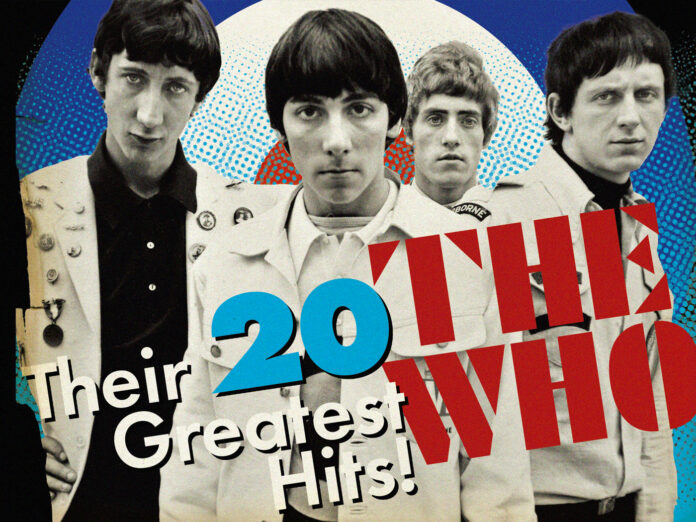My Generation (Townshend)
Producer: Shel Talmy
B-side: Shout And Shimmy (Brown)
Released: November 1965
Highest UK chart position: 2
What began as a slow blues number addressing Townshend’s disgust at his peer group’s ill treatment by their perplexed seniors ended up being not only the most famous song in The Who’s canon but the most lyrically belligerent, musically lawless expression of adolescent insolence ever committed to vinyl. Timeless in its antagonistic disregard for the establishment, regardless of any attempts to update or improve on the song – from Patti Smith’s expletive-ridden assault at the dawn of punk to Oasis’ recent stadium rock-out – nothing and nobody can enhance the unadulterated savagery and intent of The Who’s original “My Generation” as it first appeared in late 1965.
Though Townshend would divulge several different anecdotes to the press as to what inspired the track, the most popular story is that the Queen Mother, who was regularly chauffeured down the Belgravia street where the Who guitarist was living that year, took umbrage with his latest motor parked outside (a Packard hearse) and had it towed away by police.
It took three separate studio sessions to transform his outrage into the youth anthem we recognise today, speeding it up from his bluesy demo and fortifying its message of elderly detestation by having Daltrey affect a stammer. Thus, 30 seconds in, as the singer seemingly struggles to articulate himself, an aghast nation held its breath anticipating an F-word that never came.
For those such as the Queen Mum on the receiving end of Townshend’s ire, it may as well have, since “My Generation” virtually amounted to one three-minute ‘fuck off’. It comes as no great shock to learn that Entwistle broke something in the region of three bass guitars in acquiring the desired sound (his unaccompanied solo was a triumph in itself) while during the finale Moon gives the impression of an eight-armed man spontaneously combusting over four kits at once.
To call it a mere pop record is absurd (as was the fact it never actually made No 1). In the UK charts of Christmas 1965, when The Beatles were unobtrusively vowing “We Can Work It Out” and The Rolling Stones were being only slightly bolder by scoffing “Get Off Of My Cloud”, the unruly hubbub of “My Generation” wasn’t so much a pop music watershed as an apocalypse that changed the landscape forever.
Daltrey: “I have got a stutter. I control it much better now but not in those days. When we were in the studio doing ‘My Generation’, Kit Lambert came up to me and said ‘STUTTER!’ I said ‘What?’ He said ‘Stutter the words – it makes ⌦it sound like you’re pilled’ And I said, ‘Oh… like I am!’ And that’s how it happened. It was always in there, it was always suggested with the ‘f-f-fade’ but the rest of it was improvised. But… it’s a fucking great record, it really is.”
________________________
Substitute (Townshend)
Producer: The Who
B-side: Circles (aka Instant Party) (Townshend)
Released: March 1966
Highest UK chart position: 5
Despite 1965’s opening Top 10 hat-trick, by the spring of 1966 The Who’s grievances were considerable. There was a messy contractual divorce from producer Shel Talmy that was to cost them dearly, Townshend announcing on national TV that their music had no quality and amounted to sheer “musical sensationalism”, fisticuffs on stage and off, and the temporary resignations of both Daltrey and Moon exacerbating a climate of imminent self-destruction.
Thankfully, such pandemonium didn’t prevent Townshend from delivering another lyrically audacious, three-chord masterpiece. “Substitute” began as the guitarist’s reaction to media comparisons that The Who were a ‘substitute Rolling Stones’. This sarcastic germ soon grew into a sneering manifesto of class-conscious self-deprecation, harsh enough in its abusive demeanour to be adopted by The Sex Pistols a decade later as a ready-made punk calling card.
The bitterness of Daltrey’s confession (the controversial “I look all white but my dad was black” had to be removed from the US version) was intensified by Townshend’s deployment of a 12-string acoustic (a noticeable change in texture after the electric hysteria of its antecedents), Entwistle’s Motown-inspired hookline and Moon’s rhythmic typhoon (though, bizarrely, the drummer was so pilled that he professed to having no memory of the session, accusing his bandmates of recording it behind his back with an impostor).
Their fourth consecutive Top 10 hit, it still didn’t appease Daltrey’s own sense of unease that they were veering too far into the mainstream at the cost of their earlier, militant R’n’B roots.
Daltrey: “I still couldn’t find that voice on songs like ‘Substitute’. I found it very, very difficult to sing pop. My voice was very gravelly. I couldn’t identify with it, whatever the hell it was. Pop was alien to me. I didn’t really find my voice until we got to Tommy. ”



